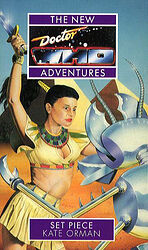
There is 1 review so far. To add a review of your own for this item, visit the voting page.
 |  |  |

 | A Strong Attempt at Redemption |
|
 |  |  |
| By: | David Layton, Los Angeles, United States |
|
| Date: | Wednesday 19 February 2025 |
|
| Rating: |    7 7 |
Set Piece is probably the best NA novel up to this point, that's 34 novels into the series. This may be because Kate Orman has taken on the assignment of closing one chapter while opening a new one and tried her hardest to make it work. In essence, one can think of Set Piece as the season finale, in which the story has to turn the volume up to 11, and maybe higher, while also tying the loose ends of the series, and correcting some mistakes, at least the big ones, from the previous episodes. Let us take the last first.
The most complained about aspect of the NAs was the characterization of Ace. They turned her into a bland, soulless, shoot first and ask no questions, kill anything that moves "soldier," perpetually angry at everything. Orman fixes this by returning the character of Ace to something closer to how the character had been in 1989. She's still a soldier and fighter, but here the problem for Ace is not that she is ever angry and resentful, but rather that she cares too much, that she has an overwhelming belief in what is right and what is wrong, and an uncontrollable urge to fix what is wrong. It is this belief that gets her intro trouble, that blinds her to the subtleties of existence, rather than anger and resentment. This is a much more likeable, understandable, and mature Ace.
The second problem of the NAs that Orman fixes is the relationship between the three principal characters. In previous NAs, this came in two forms: unbearably fractious to the point that all seem to hate each other, or Ace and Benny as agents under The Doctor's control as mastermind. In Set Piece, the trio are working together for the first time (how many novels did it take to get here?). They genuinely like each other and respect each other. In particular, Orman works very hard to restore the relationship between Ace and The Doctor, realizing that all along this has been Ace's problem, not The Doctor's.
The third problem had been the overemphasis on Doctor 7 as the master manipulator, especially one who risks his companions while staying mostly behind the scenes. Orman goes far in the other direction. The Doctor puts himself in danger first and foremost, here to the point of nearly dying three times, and undergoing three weeks of torture, and undergoing a nearly total physical transformation.
With regard to tying the loose ends, Orman here brings back a character from a previous NA, Kadiatu Lethbridge-Stewart, as pivotal to the plot. She also rummages through the main characters' memories to remind the reader of many things that had happened in previous NAs. She also brings in a few memories from the TV series, with only the occasional wink or nod to the fans. There is a bit of retrofitting explanations, mostly to make The Doctor more palatable.
And then there's turning up the danger threat to 11. The universe is at stake once again. Someone has been punching holes in space-time, and an out-of-control bio-computer spaceship called Ship is gobbling human minds to learn how to stabilize one of the holes so that it can traverse space and time to fulfill its program of saving humanity, which it has wrongly interpreted. The three TARDIS crew spend over half the novel separated from each other with no way to contact each other, seemingly alone in a time of history in which they do not belong. Orman describes torture and death in too precise detail, worryingly so in my view. Plus, Orman brings in Pain, a relative of Death, as a metaphysical entity occupying the characters' dreams.
The novel, however, is not without its problems. From the standpoint of quality of writing, this is probably the best written of the NAs up to this point. However, Orman does get carried away with the flourishes of style, writing in grand metaphors and images about things that would work better if described more directly. The novel is very violent, and I don't think it needed to be. She is a bit of a showoff regarding her literary knowledge, with a clever epigram for each chapter, often in the original language, and some of which are made up Doctor-historical author "unpublished" collaborations.
In summary, Set Piece is by far the most satisfying NA up to this point. I would give it a 7.5 out of 10, 3.5 star rating if I could.


